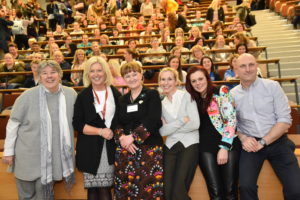Karen Galway and Catherine Monaghan, School of Nursing and Midwifery, Queen’s University Belfast, Medical Biology Centre, 97 Lisburn Road, Belfast Northern Ireland. BT9 7BL
This week’s EBN Twitter Chat on Wednesday 5th April between 8-9 pm (UK time) will focus on dementia, how we can break the taboo and improve education in this area.
The Twitter Chat will be hosted by Dr Karen Galway a Lecturer in Mental Health nursing At the School of Nursing and Midwifery, Queens University Belfast. Participating in the Twitter chat requires a Twitter account; if you do not already have one you can create an account at www.twitter.com. Once you have an account contributing is straightforward, You can follow the discussion by searching links to #ebnjc, or contribute by creating and sending a tweet (tweets are text messages limited to 140 characters) to @EBNursingBMJ and add #ebnjc (the EBN chat hash tag) at the end of your tweet, this allows everyone taking part to view your tweets.
The School of Nursing and Midwifery at Queen’s University Belfast has been championing improvements in dementia care through continuing professional development training over the past two decades. The increasing prevalence of dementia, which has been referred to as the dementia tsunami, means that healthcare professionals need more training, support and resources to help alleviate symptoms and maximise quality of life. There is a clear need for specialised training as we continue to learn more about how to prevent, diagnose and treat the condition.
We teamed up with AFTAThought Training Consultants, to take our programme of training to a new level. AFTAThought was formed in 1988, and has been inspiring people to think differently ever since. “We’re passionate about what we do, delivering training through drama to bring issues, policies and legislation to life and we’ve trained just shy of a million people.” Topics addressed in this inaugural partnership training included; public awareness, effective management, role of primary care, person centered care, communication challenges, identity, capacity and caregiving.
Approximately 300 students, researchers, statutory sector and voluntary sector health and social care professionals attended the event and we received some remarkable feedback indicating a strong and healthy appetite for this type of dementia training. Many of those who provided feedback related the awareness training to their own personal experience with dementia, as a carer or as a professional.
Gary Mitchell, Research Coordinator at Four Seasons Healthcare commented on the training session; “You’re really filling a gap with this training. It is much needed.”
The awareness training was based on a local policy document (Dementia Learning Development Framework, 2016) and peer reviewed publications we have produced 1–4. The format was based a number of scenarios including; initial recognition of a problem by an individual, reactions from their family and the GP, disclosing a diagnosis and managing family dynamics, capacity to make decisions, transitions to nursing and residential care and hospital admissions. The session ended with a touching account of how it feels to be a family member caring for someone with dementia. There wasn’t a dry eye in the house, this training hit home and you could hear a pin drop.
We were thrilled to receive spontaneous feedback via email and from some students in subsequent classes. Some of these are quoted below;
“I just wanted to send an email to say what a fantastic experience and incredible insight the dementia lecture was. I lost my father to vascular dementia 18 months ago and was delighted to see that the experiences of family and the person living with dementia was so realistically and sensitively portrayed.”
“I was a student of yours way back in 2013. I attended the dementia awareness session yesterday & just wanted to get in touch to let you know I thoroughly enjoyed it. It was a very powerful and emotive experience.”
“Fantastic training! Really enjoyed the experience and a great insight to dementia. Puts things into perspective and creates a better way of thinking. Very overwhelming performance, it was brilliant.”
“That was the best lecture I’ve ever had”
On Wednesday 5th April during the twitter chat we will continue the conversation to consider these dementia questions that we have yet to answer;
- What are the best ways to break the taboo of dementia?
- How can we best help people discuss and share their concerns, thoughts and feelings and maybe seek help earlier?
- What way should education be delivered, to allow all disciplines of health care professionals to access training that will increase the quality of dementia care?
Please join us to discuss this important medical, nursing and public health challenge.
References
1 Carter G, van der Steen J, Galway K, Brazil K. GPs’ perceptions of the barriers and solutions to good quality palliative care in dementia. Dement Int J Soc Res Pract 2015; In Press.
2 Brazil K, Carter G, Galway K, Watson M, van der Steen JT. General practitioners perceptions on advance care planning for patients living with dementia. BMC Palliat Care 2015; 14: 1–6.
3 Mitchell G, McCollum P, Monaghan C. The personal impact of disclosure of a dementia diagnosis: a thematic review of the literature. Br J Neurosci Nurs 2013; 9: 223–8.
4 Mitchell G, McCollum P, Monaghan C. Disclosing a diagnosis of dementia: A background to the phenomenon. Nurs Older People 2013; 25: 16–21.
